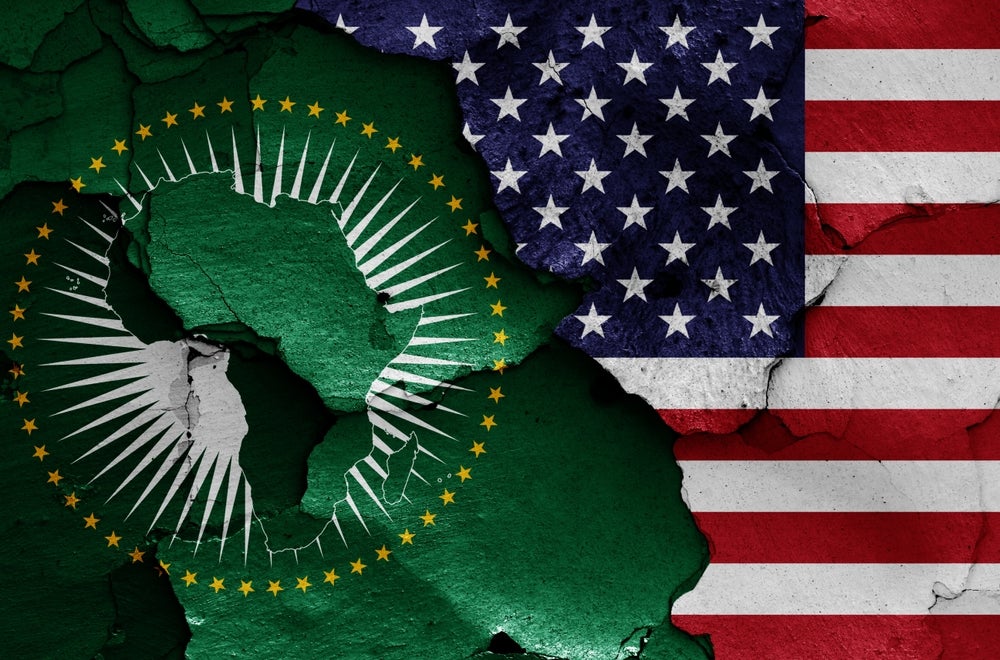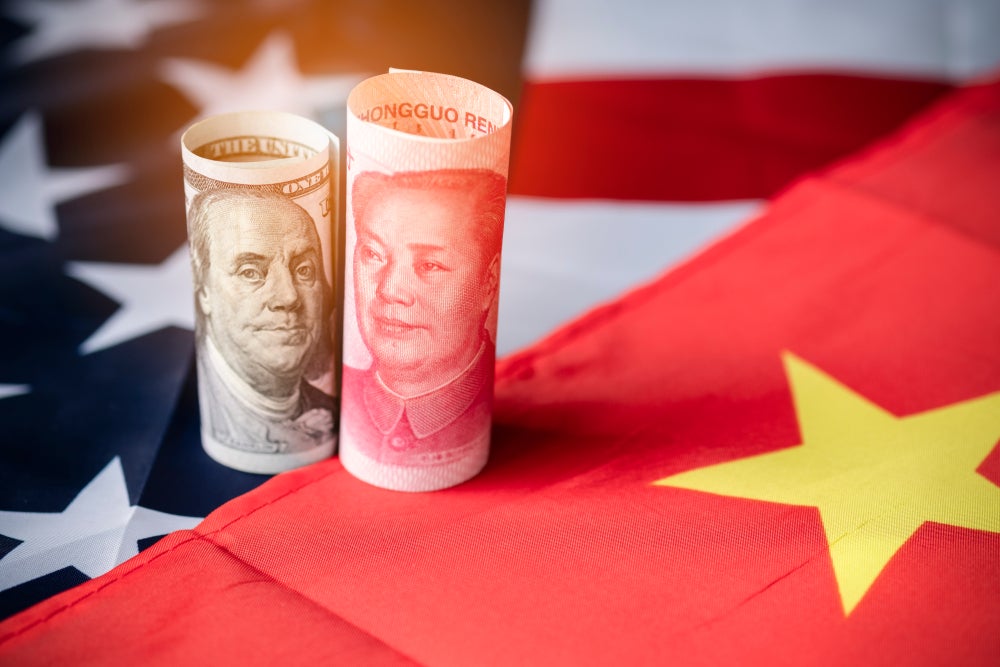United States Fashion Industry Association president Julie Hughes tells Just Style the recent US hearing on AGOA was "really important" for the wider apparel sector and adds the testimony supplied by manufacturer SanMar Corporation's general counsel and corporate secretary Melissa Nelson was "really compelling".
Nelson told the hearing that AGOA's 32 countries have "so much potential" but the US won't invest when the benefits of the trade agreement could expire before a return on investment.
What is AGOA?
AGOA has been at the core of US economic policy and commercial engagement with Africa since 2000. It was designed to provide eligible sub-Saharan African countries with duty-free access to the US market for over 1,800 products, in addition to the more than 5,000 products that are eligible for duty-free access under the Generalized System of Preferences programme.
The Office of the United States Trade Representative (USTR) highlights that by providing new market opportunities, it has helped bolster economic growth, promoted economic and political reform, and improved US economic relations in the region.
In 2015, US Congress passed legislation to modernise and extend the programme to 2025 and there are currently 32 countries eligible for AGOA benefits.
Consequences of US not renewing AGOA before 2025 expiry date
Ed Gribbin, who is on the American Apparel & Footwear Association (AAFA)'s board and trade policy committee and also participates in the Africa Working Group, believes the impact of not renewing before the September expiration date will be "a pullback on orders by brands and retailers who utilise AGOA in fear that it may not get renewed or that it could get renewed with unacceptable restrictions (like restricting third-country fabrics)".
He shares that currently, AGOA participants can source fabric from anywhere, assemble in a qualified African country and send it duty-free to the US.
He clarifies this third country fabric provision reflects the fact that Africa has "virtually no infrastructure" when it comes to synthetic yarns or fabrics.
Gribbin continues: "With this uncertainty about renewal, or timely renewal, the other impact besides caution on booking orders for next year is the virtual halt in new investments in Africa. Our group at AAFA is primarily educating legislative staff on the need for renewal as early as possible and not restricting third country inputs."
Gherzi Textile Organization partner Robert P. Antoshak is quick to add the fate of AGOA "encapsulates the political stalemate plaguing Washington these days".
Why AGOA should be renewed for at least ten years
Hughes shares the USFIA "absolutely supports" the renewal of AGOA for at least ten years and "as soon as possible", plus she'd like to see the retroactive renewal of Generalized System Preferences (GSP).
She highlights that it is slated to expire at the end of September 2025, stating: "This may seem like a long time from now, but companies make investment decisions many months in advance.
"A possible expiration of AGOA would cause great harm to the region, as evidenced by USFIA’s benchmarking survey," Hughes told Just Style.
"Indeed, one need only look at the job loss in Africa as a result of the last minute renewal in 2012 of the third country fabric provision, to see that further delay in a renewal of AGOA will discourage continued sourcing and new investment, resulting in a loss of trade and jobs in both Africa and the United States."
Possibility of AGOA renewal to 2041
AAFA's Gribbin reveals the good news is that US senator Chris Coons introduced a bill in April 2024, with significant bipartisan support for an early renewal of AGOA and to extend to 2041. This extension is to coincide with the sunsetting of the United States-Mexico-Canada Agreement.
Coons argued the longer extension period (compared to the previous extension of only ten years) will promote more long-term investments in Africa by US companies and serve to blunt the influence of Russia and China on the Continent.
Gribbin says the Bill also has no restrictions on third country inputs. He adds the House Ways and Means is currently working on similar legislation with chairman Jason Smith and other members recently visiting four countries in Africa as he is a strong supporter of AGOA renewal as soon as possible, with the hope that investments and orders going into AGOA countries will not be cut back.
Likelihood of AGOA renewal before US' November election
Antoshak is pessimistic about AGOA in the lead up to the election, stating: "Regardless of who wins the presidential race in November, AGOA will more likely be a casualty of US politics than not. In the run-up to the election, both Biden and Trump are tepid about AGOA, if not outright hostile as worst."
Gribbin takes a less pessimistic approach but remains realistic when it comes to whether or not AGOA will be renewed before the upcoming US election on 5 November.
He admits that given the US is in an election year which has its nominating conventions, summer break, fall fiscal year legislative demands and then the Christmas break, it is "highly unlikely that any bill will get consideration before the election".
However, Gribbin remains hopeful that it will be passed by the end of this year: "Both House and Senate members pushing for the renewal claim it is likely to get attached to a regular revenue bill during the “lame duck” session between 6 November and Christmas," before adding: "This is what we at AAFA are pushing for."
AGOA's success to date
The USFIA boasts more than two decades of partnership between its members and key suppliers in the AGOA region with Hughes sharing that fashion brands and retailers very much want to maintain partnerships on the continent, and to engage in new ones.
She says: "AGOA has been an undoubted success, providing US brands with a viable alternative sourcing option and providing tens of thousands of workers in Sub-Saharan Africa with a real economic opportunity. We believe the future is bright for even stronger business partnerships and look forward to being a part of that future."
However, she points out that for her member companies to continue with the partnerships they have already established and to create new ones, they need a "prompt and long-term renewal of AGOA’s third-country fabric provisions".
Impact of African Continental Free Trade Area (AfCFTA) agreement on AGOA
AfCFTA trading started on 1 January 2021 and it is described as the world’s largest free trade area as it brings together the 55 countries of the African Union (AU) and eight Regional Economic Communities (RECs).
The objective of the AfCFTA agreement is to boost intra-Africa trade, particularly trade in value-added production and trade across all sectors of Africa’s economy.
Hughes believes this regional agreement will be another avenue to encourage more trade and more investment in Sub-Saharan Africa., however she notes: "It's early to predict how quickly we will see this economic improvement, but we are confident about the future".
Gribbin agrees, stating: "AfCFTA will create a huge friction-free trading block and is sure to facilitate additional trade opportunities with the US, EU, UK and others."
He suggests it is likely to "encourage additional investments from developed countries to build infrastructure" in the region: "As the world’s fastest growing and youngest (and poorest) continent, it should pay dividends to investors for a long time to come especially as poverty is reduced and African citizens become mainstream consumers."
Antoshak argues there is still a question mark about the future of the burgeoning textile and apparel manufacturing supply chain in many AGOA countries.
"Investment in real manufacturing — not just outsourced production — has gained hold throughout the region. AfCFTA could provide some much-needed economies of scale for local manufacturers, particularly as a counterweight to the broader interests of the US and China.
"Yet AfCFTA has the potential to compound efforts to extend AGOA in its current form," Antoshak suggests.
Should Ethiopia be added to AGOA during 2025 renewal process?
Antoshak wonders whether a new AGOA agreement may have to be formulated, but he acknowledges that successfully negotiating a new revised AGOA-styled AGOA agreement with the US is unlikely until the US political situation becomes clearer after the election.
He adds that this is particularly true if an AGOA agreement were to include Ethiopia again after its exclusion in January 2022 on alleged gross violations of internationally recognised human rights.
Regarding Ethiopia, Hughes tells Just Style the USFIA does not have any insights about how talks have been going between the two governments, but she shares "we are hopeful that the situation in Ethiopia will improve and that they will again soon be eligible for AGOA benefits".
Earlier this year the president of Ethiopia’s Hawassa Industrial Park Investors Association Hibret Lemma told Just Style Ethiopia's AGOA loss was a big hit to the country’s garment sector and slowed down growth considerably.
Will AGOA uncertainty impact China?
AFFA's Gribbin tells Just Style bluntly that he doesn't think AGOA's renewal date will impact China much if at all. He points out that China will continue to aggressively invest in Africa and look to outpace the US' influence on the continent.
Antoshak on the other hand sees the failure to extend AGOA as potentially throwing investments into limbo, particularly when Chinese investment in the region is considered.
"From a geopolitical perspective, Washington is concerned about Chinese investment in the region as a perceived backdoor into the US by creating a new pro-China export platform," he says.
For Gribbin, is far more important to to emphasise that he doesn't agree with the term “uncertainty” at all when it comes to AGOA as he is adamant AGOA will renewed because "there is too much support from both parties to (a) help Africa and (b) thwart China".
He argues the key question is where AGOA sits on the priority list for a congress "not known for any sense of urgency" if you base it on how long it took for them to authorise additional aid for Ukraine.
Gribbin asserts that most in Congress, "if not pushed, would likely wait until it expires before taking any action" as that’s what they did on GSP which expired two to three years ago.
He shares there is a bill to renew it retroactively which will likely pass when AGOA renewal passes, but it’s expiration caused many companies to shift their orders for travel goods back to China and away from underdeveloped countries.
That said, Gribbin is "pretty confident that the right people in both parties are going to strongly push for rental before year’s end on a trade package that will include AGOA, GSP and Haiti HELP-HOPE as well".
















